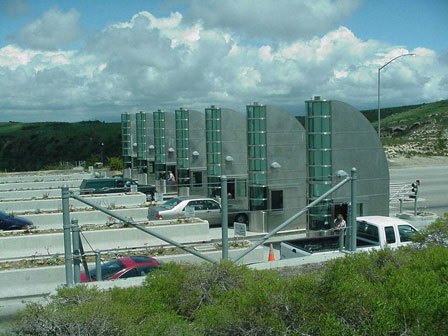CA: Do Not Ask for Whom the Road Tolls…
The Newspaper reports that the California state legislature has blessed AB3021, a measure that will expand toll roads throughout the Golden State. The CA trip A ain't too pleased with the provisions contained therein. "We support the use of tolls as one option to pay for new infrastructure; however, because the very broad toll authority proposed in this bill is not limited to new construction and because revenue from the tolls could be used for a wide array of transportation and related efforts (well beyond the roads, streets, and highways used by toll payers), we must oppose the bill. Those goals should not inappropriately be placed on the shoulders of motorists by allowing the widespread tolling of facilities already paid for by existing taxes without clear and direct benefits for the toll payers." In other words, the cash cows will graze freely while providing precious little milk for the motorists paying through the nose for the farmers' livelihoods. Or something like that.
More by Robert Farago


































Comments
Join the conversation
Richard, actually, the disconnect proves exactly what I said - the FHWA only covers expenditures made on 'highways' - i.e. signed and numbered components of state highway systems (including US and interstate highways) - but NOT including major arterial roadways funded at the local level (or non-major roads, but those cost a lot less money) - because they simply don't have the data collection tools available to go to every single jurisdiction in this country and get those numbers. It turns out that the driving urban drivers do on roads which don't get any gas taxes pays a big chunk of the missing money, and a big remaining chunk comes from sales and property taxes. For instance, using my driving, the FHWA would see all the gax tax collected from me (easy to tabulate) but not see how 90% of my driving miles are paid for - because 90% of my miles are outside the state highway system (I live in just about the oldest most urban part of Austin; the vast majority of even our major arterial lane-miles are locally funded). What the TXDOT study shows quite conclusively is that without this subsidy from urban drivers, the whole system collapses - suburban roadways don't pay for themselves. (Suburban drivers do spend a far larger proportion of their driving on roads which receive gas tax funding, in other words). To say nothing of the property/sales tax funding (my local taxes pay for state highways around here as well as all of those major arterials which aren't getting the gas tax bucks).
geeber, no, the FHWA stats include state and federal gas taxes, and the general equation holds (to greater or lesser degrees) in every state at which I've looked, including Pennsylvania (in that a much larger portion of the major arterial network in urban areas is locally-funded and usually not eligible for gas taxes).
geeber, no, the FHWA stats include state and federal gas taxes, and the general equation holds (to greater or lesser degrees) in every state at which I've looked, including Pennsylvania (in that a much larger portion of the major arterial network in urban areas is locally-funded and usually not eligible for gas taxes). Additionally, your logic is critically flawed - my figures about proportionality were per mile driven, meaning, per dollar of gas tax assessed. In other words, for every dollar of gas tax I pay, I get far less benefit than does the suburbanite for every dollar of gas tax he pays. This is a per-dollar equation that holds no matter how much or how less he drives compared to me.